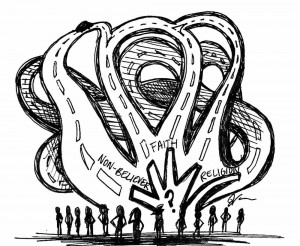The term interfaith overlooks key religions
Partially in response to President Barack Obama’s challenge issued in March to bridge religious divides and build understanding while giving university students a chance to participate in community service projects, USC hosted an interfaith memorial on Sept. 11, commemorating the 10th anniversary of that fateful day.
Calling the event “interfaith,” though, doesn’t really say anything more than naming the initiative “secular.” Interfaith is a term that should be avoided because it downplays uniqueness between various religions and faiths. It creates a contrived atmosphere, one driven by the politically correct world in which we live.
By trying to encompass all faiths, the term interfaith loses any distinction between people.
Instead, the term asks for the distinction between “religious” and “non-religious” people. Either way, its use causes people to call every way of life a “faith.” Thus, the term doesn’t carry any more meaning than refraining from denoting a religious connotation at all. Its use suggests that people should make judgments regarding what is and isn’t a religion.
This doesn’t seem to be consistent with the principles of interfaith organizations.
USC is trying to promote understanding and truth seeking among diverse groups of people. This is an admirable goal. This is also the unifying force among those who consider themselves religious.
But this can also be the unifying goal of any type of secular endeavor. Interfaith organizations that fail to define what describes a “faith,” in an effort to be all-encompassing or politically correct, really don’t say anything beyond wanting to include everyone.
A very broad range of people, including those who consider themselves “religious,” can claim solidarity in that they are seeking to understand the true nature of the universe.
This definition, though, challenges the colloquially used definition of what a “religion” even is, as doing math homework is as much of a search for truth as visiting a holy site or studying a sacred text.
That being said, the term religious can either encompass everybody, or must be distinguished, with criteria such as “the belief in a god” or something similar. Of course, this would be horribly politically incorrect. The safer option then would be to abandon such terms outright.
Rather than creating organizations vaguely named as “interfaith,” organizations that are going to distinguish themselves as religious should have something easily identifiable to unite behind. Christians, Muslims and Jews, for example, can create an organization recognizing a shared belief in a single God described in some shared texts.
This would differ from efforts to look at perceived shared values among a diverse range of religions. Looking at these shared values is to overlook the differing underlying principles behind each faith. If USC wishes to promote understanding among people of different faiths, it should not do so by asking students to only look at the surface aspects of different religions, or by pushing ideology contrary to the principles of many of the faiths it is trying to recognize by insinuating that all religions are the same.
It is clear that interfaith initiatives seek to recognize and discuss diversity.
But it is also clear that these same initiatives seek to promote unity.
Unity, as traditionally expressed in individual religions, is only possible with exclusivity.
For example, Muslims at the Kaaba participate in the same acts of worship to emphasize solidarity. Certain denominations of Christianity permit only those who have been baptized as Christians to partake in the Holy Communion. Varna in Hinduism divides society into distinct castes, each excluding the others.
Identification involves both negation and affirmation — one must say what one is and what one isn’t. Calling a group “interfaith,” considering the elusive definition of what it means to be religious, then, does not really say anything at all.
It excludes those that aren’t part of a “faith,” or suggests that everybody is part of a “faith” of some sort. Of course, saying that “interfaith” encompasses everyone would make such a group’s distinction as “religious” rather meaningless.
Alan Wong is a sophomore majoring in East Asian languages and cultures. His column “Re-Defining USC” runs Tuesdays.


All I read was the ramblings of a pompous, pretentious twat. He make a valid point, but the argument – or rather lack thereof – was pathetic. Someone please re-teach this guy how to write. Thanks.
*makes